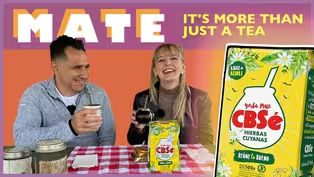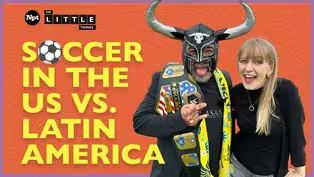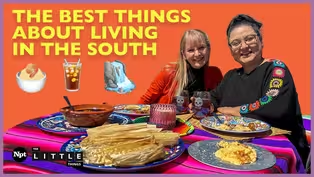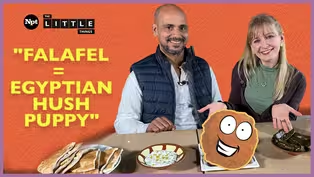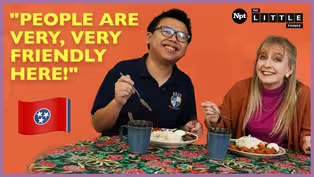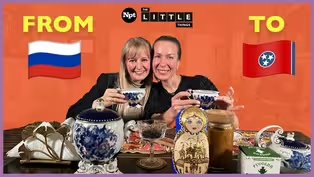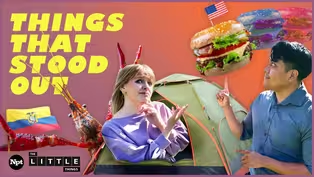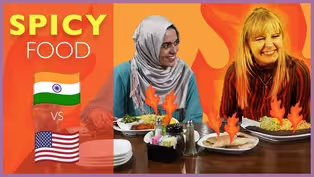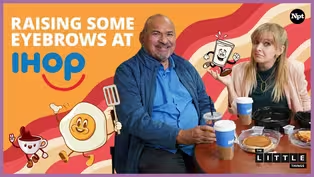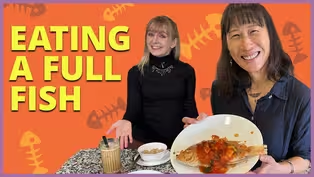
The Little Things
Special | 26m 53sVideo has Closed Captions
Moving to a new country is a big deal, but it's the little things that often stand out.
Moving to a new country is a big deal, but it's the little things that often stand out. Join us as we explore the fascinating stories of immigrants in Nashville. Although we discuss culture shocks and different ways of doing or seeing things, at its core, Next Door Neighbors: The Little Things emphasizes similarities across cultures and humanity.
Problems playing video? | Closed Captioning Feedback
Problems playing video? | Closed Captioning Feedback
Next Door Neighbors is a local public television program presented by WNPT

The Little Things
Special | 26m 53sVideo has Closed Captions
Moving to a new country is a big deal, but it's the little things that often stand out. Join us as we explore the fascinating stories of immigrants in Nashville. Although we discuss culture shocks and different ways of doing or seeing things, at its core, Next Door Neighbors: The Little Things emphasizes similarities across cultures and humanity.
Problems playing video? | Closed Captioning Feedback
How to Watch Next Door Neighbors
Next Door Neighbors is available to stream on pbs.org and the free PBS App, available on iPhone, Apple TV, Android TV, Android smartphones, Amazon Fire TV, Amazon Fire Tablet, Roku, Samsung Smart TV, and Vizio.
Providing Support for PBS.org
Learn Moreabout PBS online sponsorshipMore from This Collection
The Little Things explores life in Middle Tennessee, highlighting aspects that seem ordinary to locals but unique to newcomers. The series connects with immigrants to discover what surprised them about their new home, including food, greetings, gestures, sayings, household items, stores, and traditions. While discussing culture shocks, this series emphasizes the commonalities across cultures.
Pablo's Thoughts on Grocery Shopping in the U.S.
Video has Closed Captions
Meg and Pablo talk about grocery shopping in the U.S. versus Argentina over a cup of mate. (9m 48s)
Nashville's First Latin American Supporter Group
Video has Closed Captions
Meg interviews members of NSC's first Latin American supporter group: La Brigada de Oro. (8m 6s)
Haitian Chef Compares Meals in the U.S. and Haiti
Video has Closed Captions
Nashville-based Haitian chef Lamar Alvarez talks about food culture and life in Tennessee. (9m 41s)
From Ciudad Hidalgo to Chicago to Nashville
Video has Closed Captions
Suzy Vera shares her thoughts about life in the South and her move from Mexico to the U.S. (9m 17s)
Egyptian Chef Shares Culture Shocks in Nashville
Video has Closed Captions
From sweet tea to how quiet restaurants are, Ragab shares what stood out to him about TN. (9m 32s)
David's Thoughts on Life in Tennessee & Malaysia
Video has Closed Captions
David Chak shares what has stood out to him since his move to Tennessee from Malaysia. (7m 1s)
Talking About Life in Russia & Tennessee Over Tea
Video has Closed Captions
A Russian Nashvillian discusses cultural differences and what she loves about Music City. (8m 28s)
What a Nashvillian from Ecuador Observed
Video has Closed Captions
A Nashvillian from Ecuador shares surprises about the city's food and social interactions. (6m 7s)
Little Differences Between Ghana and the U.S.
Video has Closed Captions
A Tennessean from Ghana shares how pet food and AC in the kitchen initially surprised him. (5m 42s)
Can You Get a Truly Spicy Meal in Nashville?
Video has Closed Captions
A Nashvillian from India compares "spicy" food and family visits in India vs. the U.S. (5m 37s)
Meals in the U.S. Versus Chile: Some Observations
Video has Closed Captions
Pablo moved from Chile to Nashville. He shares some dining-related things he's noticed. (7m 59s)
A Lesson from Taiwan in Not Wasting Meat
Video has Closed Captions
Every country has traditional foods and ways of eating. Sadie shares Taiwanese traditions. (7m 42s)
Providing Support for PBS.org
Learn Moreabout PBS online sponsorship(soft music) - What is your favorite way to spend your free time in Nashville?
- I love Predators.
I'm Russian, I love hockey.
I love Percy Warner and I'm also foodie, so you will find me at a lot of local places and farmer's markets.
That is my happy place.
(upbeat music) - Here, like you, if I want to come to your house, you have to have to call or text before and say.
- Oh sure.
- You know when you are available to guys so I can come stop by.
In Egypt we don't have that.
I can like open like knock the door and open and just like make myself home like you know, my friend has a nice shirt, he just bought it.
I can just go borrow it from him and just use it for my date or something.
- So what was it like making friends when you moved to Tennessee?
- Southern people are more warm.
- They're southern hospitality, we're famous for.
- They make you feel like family.
(upbeat music) - [Narrator] "Next Door Neighbors" is made possible by the support of the Nissan Foundation.
- Hi, I'm Meg, your host for this edition of "Next Door Neighbors."
Together we're going to explore the little things that stood out to folks when they first moved to Nashville from another country.
In this episode I talk with three fascinating individuals and we begin our journey with Marieta Velikova.
Marieta moved to the US from Surgut, a Russian city in western Siberia with the taste for locally grown food, fine arts and the great outdoors.
This Belmont professor of economics has done the math and she's discovered that Nashville is a great place to enjoy many of her favorite things in life.
One random thing I wanted to ask you about.
My mother went to Russia in the nineties and she went to the ballet and she was so surprised because she saw people like getting up out of their seats and like cheering and like treating it like, like she would've seen people at a football game getting very emotional.
So how important are the arts and in Russia would you, what?
- I would say like the arts and even you, like you said, you know, even I'm an economics professor but I love art exhibits.
It's like art is so important to Russian people because art has always been, you know, if you look at our history right, we have always been repressed.
It doesn't matter which medium of art, but it was a way for people to express themselves, right?
There was the only area where maybe they felt somewhat free and I think that's why there is such a strong connection between art and people because it's not just for, you know, like higher income people to enjoy as a luxury, but it was a connection for all the people of how we all felt.
There is still that very strong connection to art, even despite the sanctions and the tragedy of war, that poor people still art is that way to forget about so many sad things and so many tragic things.
So there's still a very strong connection and appreciation of art.
- I'm sure we might get comments about, are you talking about Russia right now and people have a lot of feelings about, you know, political side of things and war.
Is there anything you say our viewers about what you've been feeling?
- You know, I will just say like we as people, right?
We don't have any influence over the political decisions of our leaders and what I would say that the decisions by political leaders, they don't determine who people are.
And that is something I will say.
I know that I think like because of this conflict there is now I think just a very understandable emotional response.
When you say anything Russian, we have negative associations or we have sad emotions.
People of Russia, there are people just like people of any nation and any state and any country, they are beautiful people just like us.
- One thing that you mentioned to me a while back was this difference related to birthdays.
Could you tell us a little bit about that?
- So if you are invited to birthday party here, so the expectation is that people who are invited are gonna treat the birthday person, right?
Whether it's a meal, multiple shots, a glass of wine, whatnot, right?
So in Russia, if I am going to invite a group of friends for my birthday, so most people still prefer to invite to their home.
So there will be a table full of different dishes and a lot of food and there will be toast.
But if I'm to invite you to, let's say a restaurant, right?
So then I will be responsible to pick up the bill for the table.
- For everybody?
- Everybody.
- And that's is the kind of.
- So do you keep your birthday invitation list small then or not necessarily?
- Depends on your budget.
Depends on your budget.
So and then, but then what happens?
People who come, they know that they don't have have to pay for a meal.
So they will bring really nice gifts and then I will treat everyone because it basically thank you for honoring me with your presence.
And I am welcoming you and I want to share this meal in honor of my birthday with my friends.
- Okay, well and so here we have some tea I thought we might try today that I picked up at a local market with a meal in the US we have ice water.
Is that traditional in Russia or would you maybe have tea more?
'Cause I know you said tea was kind of.
- So we drink a room temperature water.
We do not drink ice water and my friends always tease me.
Because when they bring water, I'll be always the one, ah, can I have water with no ice?
Please.
Even I've been in the United States since 2002, but some things just do not change so.
- Yeah, you're like, it's winter, what?
- Room temperature, water.
And then we love warm drinks.
Even maybe partial because where I'm from our winter is almost like from October to April.
So it's a very cold.
- That's a long time.
- And long winter.
So the first thing they say Russian tea.
So what is a Russian tea from English tea?
So English tea will be with milk.
Russian tea is going to be with lemons and honey.
- And we have some honey.
- So we do have lemons as well.
We just forgot to cut them.
So, but we do have real Russian honey actually brought it from home.
- It's very solid, yeah.
- And this is what it looks like.
It is a very solid, unfiltered Russian honey that we will take.
- Can we yes, yes, yes, yes, yes.
- Sure.
We just gonna dig.
Okay, yes.
And then just take as much much as you would like.
And put some in your cup.
And that is the traditional way to, it's a Russian, Russian way of drinking tea.
Tiny and lemon.
- Crazy amount or is that all right?
That's perfect.
That is perfect.
And so that's the kind of the Russian way because we believe lemons is Vitamin C, natural immune booster.
And honey, honey is good for everything.
Like it just good for everything.
- Honey is so underrated, people need talk about honey more.
- So that's the Russian way.
And then even in addition to lemon and honey will always serve something.
It can be Russian chocolates, it can be Russian cakes and can be Russian cookies.
So today we have chocolate waffle cake.
It's got some hazelnut, it's got some chocolate, it's got some waffle.
Okay, well Megan, I want you to try it and tell me what to think about it.
- I like it.
- Like it?
It's not peanut butter, but a little bit of peanuts there as well.
- I feel like this is similar to some sweets that I've seen in the US too.
So this is pretty, yeah.
An American palette.
You feel like this is, this is right at home in the pantry.
I like that.
The last question I had for you today is, what is your favorite way to spend your free time in Nashville?
- Free time in Nashville?
Okay, so I live not too far away from Belcourt Theatre.
- Okay, cool.
- I love Belcourt Theatre.
I love Ryman Auditorium.
- [Host] Oh, iconic.
- It's so iconic and unique.
I love Predators.
I'm Russian, I love hockey.
I love Percy Warner.
And I'm also foodie, so you will find me at a lot of local places and farmer's markets.
Oh, I love farmer's market, my favorite is Saturday Farmer's Market on Charlotte by the library.
Oh, I love it.
That is my happy place.
(upbeat music) - It's been such a treat to get to sit down and have tea and sweet with you and just hear about your experiences in Nashville and Russian culture.
So thank you for taking the time.
- I just want to say thank you for giving this opportunity to share some things about my culture and also share things that I absolutely love about Nashville because Nashville does feel like home.
You know, I have like kind of a loss between the two homes.
Like that is home and this is home.
So they're both homes.
So thank you for this opportunity to share something about my culture.
- You know, after talking with Marieta and sampling Russian tea and Sweets, it really got me thinking about lunch.
So I decided to visit Ragab Rashwan, Ragab is a Nashville chef and business owner who's originally from Sohag, Egypt.
In his free time you can find him reading, taking a walk, and even farming, today we're at his space King Tuts, which is a food truck and patio.
I thought I might start out by asking you about your experience bringing traditional Egyptian cuisine to Nashville.
What opportunities and challenges did you find?
- When we came to Nashville here, it was a challenge for us.
Even people warning me.
And it is cause you, no one is gonna know your food or even eat it.
So it was really hard to introduce people to falafels.
So it was like a challenge to tell them what is falafel is.
And until my wife just suggest, they like tells them it's a hush puppy.
It's Mediterranean, hush puppy.
- [Host] Mediterranean hush puppy.
- So I mentioned it to the customer, what is this falafel?
Oh, it's Mediterranean Hush puppy so they got it and they tried.
- [Host] They got it and they were like, okay.
- Oh yeah, let me try that.
And it works.
It works.
- [Host] And that's one of your most popular menu items, right?
- Yes, one of our most popular items on the menu.
- Okay, can I try one of these?
- Please.
- Egyptian hush puppies.
- [Rajib] Please, please help yourself.
- I've been looking at it.
It's been calling my name.
- Eat me Meg.
(upbeat music) - Oh, that's incredible.
- It's crunchy.
- It's crunchy - And green.
- But it's got like the moisture inside and it, Mmm.
I love it.
- I'm glad you enjoyed it.
- Thank you.
We'll dig into all this more later.
So I thought I might bring a little little Tennessee to our snack today and have brought some traditional southern sweet tea.
I imagine that tea in Egypt and the south is pretty different.
Is that fair to say?
- We inherit tea from the British since that we drink a lot of hot tea.
No one knows anything like I, growing up, I don't think I, so I don't want to drink iced tea or if any mention iced tea when I grow up, I think people will laugh at you or make fun of you.
- Really?
- Or think you are joking with them.
- So everyone drink really heavy black tea.
- Black tea, okay.
- Hot.
- So I came here to the US and when I came with my wife to Nashville, they took me to some restaurants and what shocked me is like the, like the amount of iced tea they drink.
And every restaurant has like a big glass of water.
- [Host] Oh yeah.
- [Ragab] On the table.
- Big ice water comes with your meal free.
- Also fruity iced tea, that was something for me.
- Oh, the fruit, okay.
- Yes for me is like.
- Like a peach sweet tea or something?
- Yes.
Like I can tell anyone in Egypt like mix fruit with tea, they like what you talking about?
- Do you think it would be successful or they just be weird?
- Mostly like they drink tea with lemon when they feel like having a cold.
- Oh have a cold.
- But if you mention them like have it with rich or like orange or like yeah, like all the fruits tea that use here, I don't think they would do it, no, no.
- [Host] Oh, that's so funny.
- It's a big no.
- What time do people have meals in Egypt?
Is it about the same as here or different?
- They like on the, depends where each region, so like the south, the like small towns, they grow up like they woke up early.
They sleep early.
Like in the small villages we will just like stay talking or visit or watch the TV until like maximum nine o'clock.
And then everyone sleeps, so they woke up five o'clock in the morning to start their day.
So, this people, they eat their breakfast early.
And then they eat lunch by like 11:30, 12.
And by four, four o'clock, four o'clock they're done with their dinner or five o'clock and Cairo big cities is a difference.
Cairo, you have your dinner after two o'clock in the morning.
- Two o'clock in the morning?
- That's exactly.
- For dinner?
- Yes.
People stay late.
- That's the end of dinner or the beginning of dinner?
- No, the end of dinner.
- Oh, okay.
- So they eat their dinner between like midnight until, you know, 10 o'clock until like two or three o'clock in the morning.
- Wow.
- There's also another thing is different than between here and Egypt.
In Egypt, when I took my kids to Cairo, they thought everyone is fighting in the restaurant.
- [Host] Oh, why?
- She say why they're fighting?
I told her no honey, they're just talking because they're loud.
Like when you are talking in like in over in a coffee house.
Talking about politics or sports team?
Competition.
My team.
My team.
So you think like if you are walking in the street, you think these people are in fights.
- [Host] That's just the the speaking level.
It's just a little higher.
- The speaking level of that volume is really high.
Here it's too quiet.
- [Host] Too quiet?
- Too quiet.
- Like I'm not in the library.
What is going on here?
- Exactly.
It sounds like a library in the restaurant.
- That's funny.
- Especially when you go to like a fine dining restaurant.
It's so quiet and just like, I felt like I'm feeling asleep.
- Okay that's such an interesting difference.
So food's one way that people connect, but I just wonder are there other differences related to the way that people connect or hang out or even greetings that you notice?
- Yeah, here is like in Egypt, if you are in a restaurant or a coffee house, you can talk, you easily get to to know who's next to you at the table next to you.
And you might become friends and you might end up, you are not paying for your food.
They might offer you the food.
- That's very nice.
- They're really into each other.
When I was teenager, like me and my friends, we like take the transportation, the public transportation.
My friends can sit in my lab, I sit in their lab like grade fingers together, walk in the street holding hands or just.
- That's just like a traditional way to?
- Yeah, just like that.
Like when I first came to New York and I was coming out of the subway from Penn Station in 7th Avenue and as a guy walking next to me, like at the opposite direction for this like a escalator and I was smiling and he turned back and he told me, Hey, I'm not gay.
- And you're like, what, me either?
- So what's the problem with the smiling to each other?
So there's one thing here in the US.
- Different cues that people?
- For man from a different culture it is easy to have a girlfriends than having a guy friends.
- Oh.
- It's really there's, you have to get to know the person really well before they can open up.
- You thought it was a little bit harder to make guy friends?
- Yes just people are a little bit less open to making new friends.
- It's a lot of work.
- Interesting.
It's a lot of work.
- What other little differences have you noticed related to maybe customs or just the way you hang out with friends or families is there anything else?
- Yeah, there's a few differences between here and there.
Here, like you, if I want to come to your house or to my family, like in general, like a family house, it's, you have to have to call or text before and say, oh sure.
You know when you are available to go so I can come stop by.
And in Egypt we don't have that.
I can like open like lock the door and open and just like make myself home.
But not with the strangers.
Like people you know, like part of your family.
- Friends too though?
Or just family, friends as well.
- Friends as well as, you know, you I can come to your house and just like open the fridge.
- And yeah.
- Whatever's there I can eat.
When I was growing up with my friends, like, you know, my friend has a nice shirt, he just bought it.
I can just go borrow it from him and just use it for my date or something.
- Yeah, that's really making yourself at home.
- And nice shoes and nice shoes.
The same saying I don't have money and he's asleep.
I can just like try to wake him up if he's not.
I just like check his wallet and get whatever I want and I can tell him that, oh, I took 10 Egyptian pound or 20 for my going out today.
- Sounds like people are really just generous then.
- We call every mom as our mom.
So my friend's mom is my mom.
So we have really good open relationship for like being a family to altogether.
- Yeah, your friends sound like family then.
- Yes.
- I wanted to ask you, so say that it's Monday your day off.
What do you like to do just here in Nashville or in Tennessee in general with your free time?
- Walking, outdoor hiking or gardener farming.
It's really my favorite.
Nashville, Tennessee has in general good places to go visit.
So like Sewanee and Rock Island in Nashville here, there's like Percy Warner.
Yeah.
Yeah, that is a nice place too.
I like going there because also it's like a kind of spot.
Owls and the deer.
- Oh yeah.
We do have a lot deer in Tennessee.
- I saw the deer, like these things I saw in the zoo in Egypt.
I never saw something.
- Oh and now they're just, yeah.
They're around quite a bit.
- Wild Turkey, like running around.
- Wild Turkey.
- Remember I came from the desert, so we don't have any trees.
We have palm trees.
- It's very different from here.
- That's the only one we have.
Or farms.
But here is for me is like a forest.
Something is really good to enjoy.
- We'll have to check out your recommended spots.
I love to hike too.
And I feel like we really need to dig into this.
So we should wrap up our.
- [Ragab] Please.
Yeah, please help yourself.
(upbeat music) - As I talk with folks who've made their way to Tennessee from far away places, there's certain themes that come up time and again, there's language, customs and fashion, but no topic resonates quite like food.
For our final segment, I'd like you to meet Suzy Vera.
I've experienced only a fraction of her cooking, but it took just one bite to fall in love.
Born in Ciudad Hidalgo Mexico, Suzy brings not only her culinary zeal, but also her zest for life to Nashville.
Together with her husband artist Jose Vera, as well as her children and grandchildren.
She makes the most of all Tennessee has to offer, including our state parks, diverse music and yes, traditional southern cuisine.
So I wanted to kick us off talking about food and what you thought about the food in the US when you moved here from Mexico.
- So I got in this country when I was about, I would say nine years old.
And my father brought me to Chicago.
So being from the country and then moving to Chicago at that age, it was an experience.
Not a very pleasant experience.
It was kind of a dramatic, I would say, because I was used to having home cooked meals.
Everything that we ate, it was homegrown.
So it was more, we say organic, got to Chicago.
I didn't like the tortillas that they had.
I like the weight they make, the Mexican food.
Definitely American food.
I try hamburgers.
I was like, I don't know about the hamburgers.
I mean, I was not very, because they're so different.
It was different.
So my father lucky me, he was a sous chef in an Italian restaurant.
So he was like, okay, let's try this.
I'm gonna start you with Italian food.
And that I definitely love it.
- [Host] Okay, and you still still like Italian food today?
- Yes, yes I do.
I cook a lot of Italian fresh food to brought some of the Italian foods 'cause.
- [Host] We have plenty.
- Yeah, I know.
But yeah, my kids love, I learn how to make lasagna.
I know how make, how to make it when I was 13.
- You can cook so many things.
And I also wanted to ask you about just that experience of moving from this small town, a ranch like you said, to a big city like Chicago.
What was that like at that age?
How was the transition?
- It was, like I say, it was a very, I would say traumatic.
- Kinda traumatic?
- Because one, I didn't know the English, so I had to learn English.
That was one thing.
So I would go into the classroom, everybody was talking.
I couldn't understand anything but I didn't want to stay back and not know.
So I started taking my personal English lessons.
Bought me a dictionary and remember that bought me my dictionary.
- That's how you started just with a dictionary?
- Yeah, a dictionary.
And I used to listen to songs and I used to write the songs.
Translate the songs.
The ones that I like, put them in English and then translate 'em to Spanish.
- That's such a good way to do it.
- Yes.
- Who were your favorite artists at the time?
- Mariah Carey definitely is on my top list.
Whitney Houston.
Boys II Men.
- [Host] Love it.
Love it.
- Definitely.
And Celine Dion.
And that's how I started learning English.
And as I think it took me about a year.
I was young.
- That's pretty fast.
- When you are young.
- Sponge, right, just absorbing a sponge.
And you had told me something a while back about your style and how it was a little different maybe than the kids there and how you just got comfortable with yourself.
Can you just share a little bit about that process.
- In Mexico, I'm used to wearing boots.
As you can see, I'm always wearing boots because you're on the farm, so you wear boots.
So I would wear skirts and boots or I had my own way of dressing and kids would be like, why would you dress like that?
You know 'cause at that time in the nineties, the girls, they would dress up and they would like put their hair.
A lot of hairspray and makeup and mini skirts.
- Jean, Jean, jean.
And I don't, I don't wear miniskirts up to date.
I just don't wear miniskirts for some reason.
I just, I'm weird like that.
And they used to pick on me and they were like, why do you dress like that?
I mean you're, I'm like, this is how I like it.
I mean, yeah.
Are you buying my clothes?
- Are you buying my clothes?
So you've always had your own kind of unique defined style and Jose does too.
- So, yes.
I love that about you too, it's so crazy because when we are, like, when we go out, we get ready, he's like, how this look?
I am like, yeah, no, I don't think that suits you.
He's like, okay.
And then I'd be like, how this look?
The red shoes, these shoes.
So we just have.
- You help each other?
- No, but we have like a kind of competition.
He's like, I'm gonna look better than you do.
I'm like, you're not gonna look better.
But yeah, it's crazy.
But we get a along fine.
I think we're a perfect match.
Because both are, we both like to cook.
We both like to dress up.
We both like to dance.
We both like almost a similar things.
Like this is our hangout place.
You can see this is your house.
- Which is gorgeous.
So colorful and vibrant.
- We have our friends, they come over so many talented friends.
They come, they sing on stage and then I cook for them.
- So what was it like making friends when you moved to Tennessee?
Did you find it easier being older and just kind of adjusting?
- Yes.
I think Tennessee, it's more friendly than being up in north.
Southern people are more warm.
- Southern hospitality.
We're famous for.
- Yes, they make you feel like family.
When I came to Tennessee was in year 2007.
And then this place where I work, it was mostly older people.
And it was easy for me to make friends.
Tennessee, I definitely love it.
I don't think sometimes I talk to my husband like, oh, what if we move somewhere else?
I'm like, no, I like it here.
I mean, in Tennessee I like the, the falls.
I go to the parks.
My kids, they know.
We have an experience, there's so many falls that we have been through.
I think if I would've moved from Mexico to the beginning from Tennessee, I would not have the same transition.
- Would've been easier?
- It would be easier.
Because the southern, it's more similar to what I was raised.
- In what way?
- Like, see you just heard the rooster just next door.
- We did just hear a rooster.
- So it's very similar, in Chicago, is ambulances, fire trucks.
- [Host] Airplanes, sure.
- Yeah, it's just noisy with cars and trucks and it's, yeah.
No, this is peaceful.
So I came here.
- What did you like about it?
- The food.
- The food.
- Oh, we should talk about the food I brought, I did know that you like grits.
So we have some shrimp and grits we're gonna try.
Fruit tea as well.
- Fruit tea.
- We've got some peach tea here.
- Love.
So the food, the southern food that I really, really, really like the grits is one of my favorites.
There's a place, but I love the chicken.
The fried chicken.
Definitely the fried chicken.
- The spicy or?
- The spicy, hot chicken.
Yeah, the fried chicken.
The spicy one.
They have the sweet potato, the patties, the sweet potato.
That's really, really good.
The greens.
Because the greens.
- [Host] Collared greens?
- Collared greens 'cause in Mexico we had something called quiletes.
So it looks like they're kind of the same.
So that's why I like it a lot.
- [Host] More similarities than I would've thought.
- [Suzy] The meatloaf love their meatloaf.
Next time you go there, you try the meatloaf.
- To H&T's, Have you tried the meatloaf there?
- Yeah, Uh huh.
- Well speaking of food, my tummy has a grumbling.
Can we try some of this?
- Yeah, definitely, let's go ahead.
Try have some of this chicharron, this is my favorite in the whole world.
- I'm not even just saying that because Suzy's here.
This is actually we.
- We made, we bought the pork belly yesterday when we were making it.
So it's fresh, fresh, fresh, fresh.
- Looks amazing.
And then we'll get some of our southern grits over here.
- I got this.
- Shrimp and grits.
- Yes, this is really good.
Give me a little scoop there.
- And then I made tamales for extra.
You wanna try a tamale?
- [Host] Should we try tamales?
Yeah, let's do.
- [Host] Or we can split one.
- Let see ah-ha.
- [Host] I'm digging in.
(group laughing) So good.
Yeah.
I don't know what kind of magic you put in here, but just the spice level and it just melts in your mouth.
I'm in love.
- Try the tamale.
- Okay.
This is not spicy.
- Yeah and the (foreign language), is also just really great and they go well together because if you're getting a little spice kick here, you can cool it down here.
Okay and now let's see if the grits is a weird combination if we approve of it.
Little southern fusion.
Oh, they're really good too.
H&T's coming through for us.
Oh yes, you were correct.
And then we're gonna have a little swig of our peach tea.
- I love the grits.
- Yeah, I think this Mexican Southern fusion is approved at least on my end.
What are your thoughts?
- Yeah, definitely.
- Good, definitely.
(group laughing) - While we may discuss culture shocks and different ways of doing or seeing things at its core, "Next Door Neighbors," the little things emphasizes similarities across cultures and humanity.
If you enjoyed this show and would like to see more, you can watch the entire "Next Door Neighbors" series on the PBS app.
Until next time.
(upbeat music) - [Narrator] "Next Door Neighbors" is made possible by the support of the Nissan Foundation.
(upbeat music)
Support for PBS provided by:
Next Door Neighbors is a local public television program presented by WNPT

